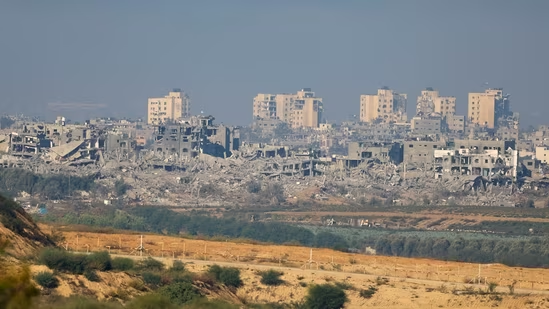As Israel fights on in Gaza its dilemma gets worse
A LARGE SCREEN dominates a tent at the edge of a military base in the Negev Desert. Dozens of blue squares represent Israeli troops on the ground, 20km away, north-east of Gaza city. Inside the headquarters of one of the infantry brigades of the Israel Defence Forces (IDF), operations officers co-ordinate search-and-destroy missions of Hamas tunnels from afar.
 PREMIUM
PREMIUM Two weeks after the launch of its ground offensive inside the Gaza Strip, Israel has around four divisions (somewhere around 10,000 troops) in the territory. Some of the columns are making their way into the centre of Gaza city. Others are operating in the outlying towns, which are now mostly empty, going from house to house, searching for more tunnel openings. “This will be our only opportunity to finish off as much of Hamas’s underground network as we can,” says one of the officers, referring to the group’s 500km-long tunnel system. “We don’t know how long we have to operate and we need to make the most of it while we can.”
Read all our coverage of the war between Israel and Hamas
Western support for Israel’s campaign is wavering. On November 10th France’s president, Emmanuel Macron, called for a ceasefire in Gaza, saying that, although he supported Israel’s right to respond to Hamas’s terror attack on October 7th, “de facto, there’s babies, there’s ladies, there’s old people bombed and killed. There is no reason for that and no legitimacy.” But Israel’s closest ally, America, has not yet demanded a ceasefire, so the IDF is wasting no time. Israel’s army has, however, reached a point in its campaign where the Israeli government’s stated objectives—to destroy Hamas’s military infrastructure and to rescue the 239 hostages still held in Gaza—are in increasing tension.
In recent days much attention has been focused on the hospitals in central Gaza, especially al-Shifa, the biggest. These have become concentrations, not just of the wounded, but also of thousands of civilians who remain in the city, sheltering around them. A doctor at the al-Ahli hospital said that the facility’s blood supply had run out on November 12th, preventing patients from being transfused. Israeli intelligence believes that the hospitals are also where Hamas’s main underground headquarters are situated. Staff at al-Shifa have accused Israel of firing on them and causing the deaths of patients by cutting off the hospital’s electricity.
On November 12th the IDF announced that it was opening up an escape-route for civilians out of al-Shifa and two other hospitals, which would get them them to the road leading south of the Israeli perimeter. Israeli officials say that the order to launch a final assault on the hospitals that it says are Hamas’s headquarters has not yet come from the war cabinet led by Binyamin Netanyahu, the prime minister. But on the same day, Jake Sullivan, America’s national security adviser, while acknowledging “open source information” that pointed to Hamas’s use of hospitals as arms caches and command posts, told CBS News that his country “does not want to see firefights in hospitals, where innocent people, patients receiving medical care, are caught in the crossfire.”
The main reason for the cabinet’s reluctance is the hope of reaching an agreement with Hamas on the release of a large number of hostages; Israel is holding out for at least a hundred. In return Israel would free some Palestinian prisoners—it holds 4,450 of them in its jails—and allow more supplies, including fuel, into Gaza. Indirect talks on any kind of deal are ongoing in Qatar and Egypt, but the final word will be that of the head of Hamas in Gaza, Yahya Sinwar, who is Israel’s prime target. It is unclear whether any deal would postpone the IDF’s attempt to destroy any Hamas’s facilities near or below the hospital; it seems unlikely to abandon it. As the tense negotiations continue, Israel is trying to urge as many as possible of the remaining civilians inside Gaza city, who are thought to number around 100,000, to leave for the south as well.
But the Israeli government’s refusal to commit to any form of Palestinian control of Gaza after the war is also undermining international support for its campaign. Members of the far-right coalition have been calling for Israel to re-occupy Gaza and rebuild the settlements that Israel dismantled there in 2005. Mr Netanyahu has denied that there are any plans to do so but has also insisted that Israel should retain, post-war, the “overall security control, including the capacity to go in whenever we want to eliminate terrorists who may pop up again”. He has also ruled out a return of the Palestinian Authority (PA), which was ousted by Hamas in a coup in 2007, saying it “educates its children to hate Israel, to kill Israelis, to eliminate the State of Israel” and that its president, Mahmoud Abbas, “still has not condemned the terrible massacre 30 days later.”
The Biden administration has already made it clear that it wants the PA to control Gaza once the fighting is over—and is working towards such a future. Mr Netanyahu, whose public support has been plummeting, seems more worried about clinging to his shrinking nationalist base than preparing for the enclave’s fate if Hamas is removed from power. Yet in a sign that he may not be in office forever, Israeli officials are already quietly working on plans for Gaza under PA control.
© 2023, The Economist Newspaper Limited. All rights reserved. From The Economist, published under licence. The original content can be found on www.economist.com
Continue reading with HT Premium Subscription
Daily E Paper I Premium Articles I Brunch E Magazine I Daily Infographics Subscribe Now @1199/year Already Subscribed? Sign In
Disclaimer: The copyright of this article belongs to the original author. Reposting this article is solely for the purpose of information dissemination and does not constitute any investment advice. If there is any infringement, please contact us immediately. We will make corrections or deletions as necessary. Thank you.
Title:As Israel fights on in Gaza its dilemma gets worse
Url:https://www.investsfocus.com







